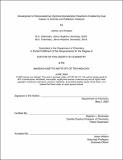Development of Stereoselective Hydrofunctionalization Reactions Enabled by Dual Copper (I) Hydride and Palladium Catalysis
Author(s)
Knippel, James Levi
DownloadThesis PDF (41.61Mb)
Advisor
Buchwald, Stephen L
Terms of use
Metadata
Show full item recordAbstract
Copper(I) hydride (CuH) complexes are versatile reagents for the reduction of carbonyl compounds, Michael acceptors, and olefins. Further, the hydrocupration of unsaturated species (olefins, dienes, alkynes etc.) offers convenient access to catalytic amounts of stereodefined organometallic nucleophiles. These in situ generated organocopper species can be subsequently trapped by a variety of electrophiles for productive bond-forming reactions. This dissertation describes several new CuH-catalyzed hydrofunctionalization reactions, particularly those which rely on dual CuH- and Pd-catalysis. Chapter one offers a synopsis on the history of CuH catalysis and the seminal discoveries in dual CuH- and Pd-catalyzed reactions. Chapter two describes the CuH-catalyzed C2-allylation of benzimidazoles. Chapter three details the discovery of the dual CuH- and Pd-catalyzed hydroalkenylation of olefins. In chapter four, the development of a dual CuH- and Pd-catalyzed synthesis of Z-dienes is recounted. The final chapter covers the hydroalkenylation of vinyl metalloids, including vinyl silanes and vinyl boronate esters.
Date issued
2023-06Department
Massachusetts Institute of Technology. Department of ChemistryPublisher
Massachusetts Institute of Technology